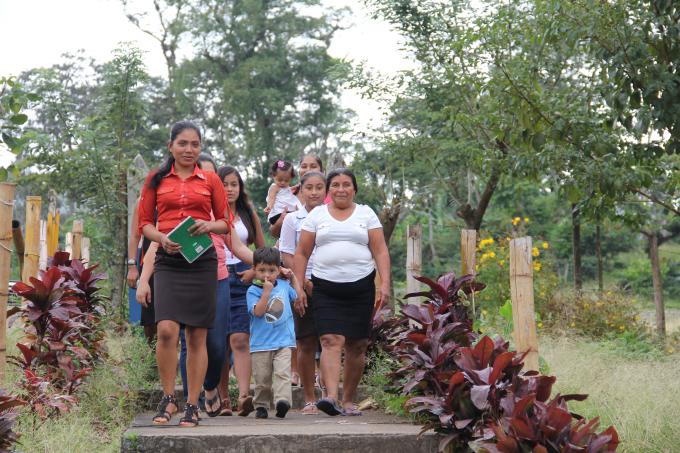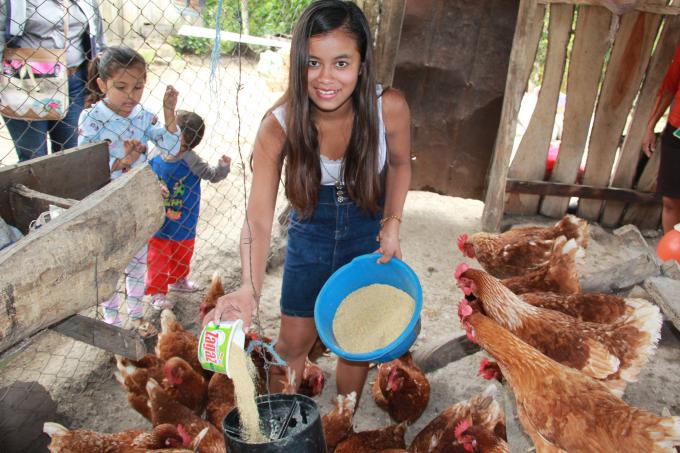 Nicaragua
Nicaragua
Languages
More than a project: A new outlook in life
Nine young women and girls aged 13-24 are waiting for us at a school in the community of Valle de la Isla in the municipality of El Tuma-La Dalia, department of Matagalpa, some 175 kms from Nicaragua’s capital city of Managua. It is cold and the light is rather pale due to the drizzle that is falling, but this is a great opportunity to enter into the warmth of a good conversation because we are here to learn about what these youngsters have in common.
At first sight, all of these women and girls are different. Some are mothers carrying children, while others are studying and yet others are helping their families the best they can as housewives or working on small coffee plots. Today, however, they have come together to talk about the “Cup of Excellence with Young Entrepreneurs” project that Save the Children has been implementing since the end of 2016 in the departments of Matagalpa and Jinotega with funds from Bezos Family Foundation. All nine of them are participating in the project.
We go into one of the classrooms at the community school, sit in a circle and they start telling how they feel about the project. They all agree that it has been beneficial. “The thing I’ve liked the most are the talks, because we’ve been trained on gender equity,” 24-year-old Claudia Mendoza tells us. One of the aims of the project is for the participants to reflect on sexual and reproductive rights, family planning and children’s rights, while also learning about issues that contribute to their personal growth and efficacy.
They also mention what they do to earn a living and how they support themselves. Most of them work with their families because they cannot study or get formal work in their community. “At home, there’s a little bit of income from coffee because its harvesting time at the moment, so we live off that,” says 13-year-old Cándida Gámez, “but in the ‘quiet time’ (April to June, when there is no coffee picking) my older brothers look for work to help out.”
Cándida is one of the youngest in the group and also the only one still at school. She is currently in the fourth year of her secondary education in the same school where we are meeting, because the other regular schools are a long way from where she lives. “As you know, the economic possibilities are very limited,” she explains with a shrug, “so you choose to study here in order to keep the costs down.”
Most young women and girls cannot carrying on studying after they finish secondary school because of the costs involved in travelling to the municipal capital or other municipalities. Many have not even been able to finish primary school. Heyling
Mendoza is the exception. “My dad’s helping me and I’m dedicating myself just to studying,” she says with a smile. “I’m about to start my second year of agronomy as a technical education. I have a scholarship in San Dionisio from ODESAR (Save the Children’s partner in the Fight against Child Poverty program).” Heyling is 21 and a single mother, like so many other young women and girls in this part of the country.
In addition to training young people and helping them improve their income through coffee production, the “Cup of Excellence with Young Entrepreneurs” project is also funding the start-up investment to develop different business initiatives in their communities. The idea is to at least provide them with an alternative for earning money in their localities if they cannot study. Talking about the project, Cándida says, “It’s seemed very important to me because it helps us families with limited resources and can enable us to do something new at home.”
So far, two business initiatives have been implemented in Valle de la Isla: pig butchering and egg-laying hens. Each is being administered by a group of three of the women and girls. In addition to making money, the aim is for them to dedicate themselves to something they like doing and are committed to follow through on.
The girls who decided to do pig butchering received funding to buy two pigs in order to sell the meat. “I chose it with my group because I like making nacatamals (a typical dish of corn mass with pork, vegetables and rice, among other ingredients, wrapped up in a plantain leaf and boiled in water),” Heyling explains. They then used the money they made to buy two more pigs. “We’ve butchered four pigs in total, one every fortnight or every month,” she adds.
Meanwhile, the egg-laying hen initiative has 50 hens that are kept in a coop at the home of one of the young women in the group. This activity requires a little more work and care, fostering collective participation and team work, which is another of the project’s aims.
“It’s been really interesting for me,” states 22-year-old Noemí Herrera, who is part of the egg-laying hen group and also a project promoter. “Working in a group has helped me a lot, which is the most important thing because sometimes you don’t know how to work with the other colleagues.”
For 20-year-old Ana Yubelka Ramos, the experience of working in a team has also been rewarding and has encouraged her to remain in the project. “We feel we’re doing well,” she comments, “because when we offer people eggs they say ‘Yes, bring us some,’ and we haven’t let anyone down.”
The three girls are organized in such a way that each one looks after the coop for a week. “I live a bit far away, a fifteen-minute walk,” says a happy Cándida as she puts chicken feed into one of the containers in the coop. “I come at six in the morning, clean out the coop, feed the hens and give them water. Then I come back later, at about 10 am, to give them more water and they get more food at about three in the afternoon.”
These three youngsters put a lot of effort into their work. “Sometimes it’s hard because you have to get up at about 5 am to come here at around six in the morning,” says Cándida. “Of course, I’m kind of used to that because I get up early when I go out to pick coffee, at about three in the morning.” However, her interest and great care have paid off as they have already sold around 900 eggs in their community and now have four local stores and a farm as regular customers.
With smiles on their faces, these adolescent girls and young women stress that the project is a source of hope and an opportunity to push ahead, so they need to continue their efforts even after the project comes to an end. “We don’t want to finish when the project ends; we want to push on with what we already have, creating other initiatives that are maybe even bigger,” Noemí insists. “That’s the idea: not to be satisfied with the little we have, but rather to expand the business initiative.”
The process that these adolescent girls and young women are going through could also act as a springboard for achieving personal goals. Ana Yubelka is quite clear about this: “Let’s see what the girls think, because when the project finishes I’m thinking about reinvesting my earnings into another initiative and following my dream of being a seamstress.” The “Cup of Excellence with Young Entrepreneurs” project in the community of Valle de la Isla in El Tuma–La Dalia is definitely marking a turning point in the lives of these young people.

